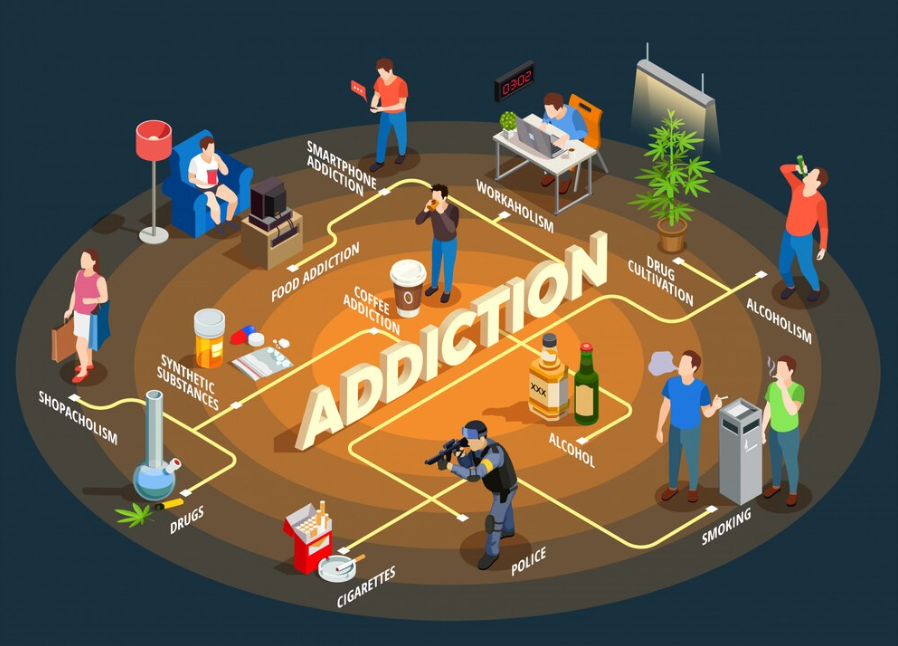Are There Different Types of Addiction?
How is Addiction Defined?
Addiction is a chronic, treatable condition marked by compulsive engagement with rewarding stimuli despite negative consequences. It encompasses both substance use (e.g., drugs, alcohol, nicotine) and behaviors (e.g., gambling, eating disorders, gaming) that can disrupt daily life and negatively impact mental and physical health.[1]
Addiction is characterized by:
- An inability to control one’s use of a substance or engagement in a behavior
- Continued use or engagement despite negative outcomes
- Intense cravings and other symptoms that interfere with daily life
Recognized as a mental health condition, addiction is categorized as a substance use disorder or behavioral addiction in the DSM-5 (Diagnostic and Statistical Manual of Mental Disorders). It affects brain regions involved in reward, motivation, memory, and self-control.[2]
Substance Use vs Behavioral Addiction
Addiction manifests in two primary forms: substance use disorders (SUDs) and behavioral addictions. While they differ in their focus, both types share key characteristics, such as the activation of brain reward pathways and compulsive behaviors.
Substance Use Disorders (SUDs)
Substance use disorders involve the misuse of substances, including legal and illegal drugs. Characteristics include:
- Physical Substances: Addiction revolves around substances such as alcohol, drugs, and nicotine.
- Tolerance and Withdrawal: Over time, users may need larger amounts to feel the same effects, and they may experience withdrawal symptoms if use stops.
- Neurobiological Changes: Prolonged substance use can alter the brain’s structure and function, affecting reward and motivation systems.
- Health Consequences: Physical health complications, such as cardiovascular and liver damage, are common.
- Legal and Social Issues: Substance abuse can lead to legal problems and negatively impact relationships and work.[3]
Behavioral Addictions
Behavioral addictions involve compulsive engagement in certain activities despite adverse consequences. Characteristics include:
- Non-Substance Behaviors: Behavioral addictions center around activities like gambling, gaming, or internet use.
- Activation of Reward Pathways: These activities stimulate dopamine release, reinforcing behavior.
- Potential for Tolerance: Some behaviors may require more frequent engagement to achieve the same level of satisfaction.
- Psychological Impact: Behavioral addictions can lead to psychological distress, impair daily functioning, and negatively impact relationships.[4]
Addiction Examples
Substance Addictions
- Alcohol: Alcohol use disorder (AUD) involves a compulsion to drink despite harmful effects, often leading to tolerance, withdrawal, and impaired control.
- Caffeine: Excessive consumption can lead to dependence, with symptoms such as headaches and irritability upon withdrawal.
- Cannabis: Characterized by cravings and tolerance, cannabis use disorder affects daily functioning.
- Hallucinogens: Misuse of substances like LSD and psilocybin can alter perception and mood.
- Inhalants: Inhalant misuse can cause rapid intoxication, leading to health risks.
- Opioids: Opioid use disorder (OUD) involves misuse of prescription painkillers or illicit opioids, leading to cravings and withdrawal symptoms.
- Sedatives and Hypnotics: Misuse of benzodiazepines and sleep aids can lead to dependence and respiratory issues.
- Stimulants: Cocaine and methamphetamine misuse can increase alertness but lead to cardiovascular issues.
- Tobacco: Nicotine dependence can cause withdrawal symptoms and serious health risks.[5]
Behavioral Addictions
- Food: Compulsive overeating, often triggered by emotions, can lead to obesity and guilt.
- Gambling: Characterized by compulsive gambling despite financial and relational harm.
- Sex: Excessive sexual behaviors can cause social and personal issues.
- Technology: Excessive use of digital devices can lead to social isolation.
- Impulse Control Disorders: These disorders, such as kleptomania, involve difficulty controlling specific actions.[6]
What Treatments are Available for Addiction?
Comprehensive treatment addresses physical, psychological, and social aspects of addiction. It often involves:
- Outpatient Treatment: Flexible treatment for those maintaining daily responsibilities, offering therapy sessions and support groups.
- Residential Treatment: Immersive, round-the-clock care in a structured environment.
- Intensive Outpatient Programs (IOPs): A middle ground offering structured sessions while allowing individuals to live at home.
- Therapy Approaches: Counseling, CBT, medication-assisted treatment, and group therapy.
- Aftercare: Ongoing support, relapse prevention, and wellness programs help sustain recovery.[7]
High-Quality Addiction Treatment at SlyAcademy
At SlyAcademy, we’re dedicated to providing comprehensive addiction care that focuses on treating co-occurring mental health conditions and substance use disorders. Our evidence-based programs span from detox and residential care to outpatient treatment, ensuring a tailored approach for every client’s journey toward wellness.
Contact us today to learn how we can support you or your loved one on the path to recovery.








